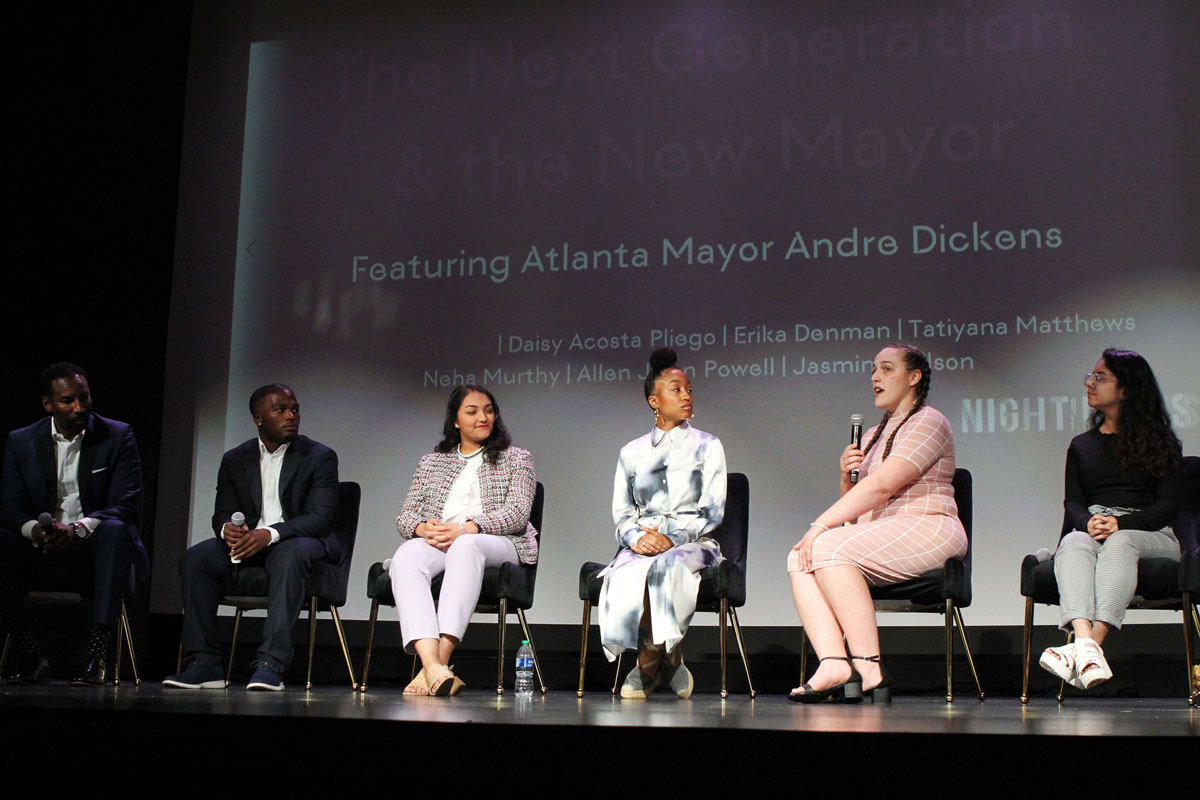
Photograph by Connie Cross
The most famous icon of France’s influence in America stands at 305 feet tall, weighs 225 tons, and was shipped from Paris in hundreds of pieces before being reconstructed in New York harbor in 1886. The Statue of Liberty still enchants her visitors, but these days, French diplomacy packs a little lighter. In fact, last weekend’s Night of Ideas festival at the Woodruff Arts Center—which featured conversations about Atlanta’s future between local creatives, entrepreneurs, and intellectuals—was so distinctly Atlanta that one might hardly have realized it was co-sponsored by the French Consulate.
That was intentional, said Gaëtan Bruel, ahead of Saturday’s event. Bruel is the cultural counselor of the French Embassy in the U.S. and director of Villa Albertine, a French cultural institution that facilitates artists’ residencies in 10 American cities and around the world. “We’re not here to first and foremost to raise the French flag,” he said. “We believe that . . . it’s less important to promote French artists than to create a global frame for debates.”
The French Embassy introduced the Night of Ideas festival in the U.S. in 2015 and now hosts the event annually in dozens of cities, from New York to Kathmandu. The “marathon of ideas” runs late into the night, held on the same day all over the world. This was Atlanta’s first year in the program—“We should have been here earlier!” Bruel quipped—and to pull it off, Villa Albertine partnered with the Atlanta Mayor’s Office of Cultural Affairs to curate a roster of speakers with deep ties to Atlanta’s cultural life. The list was dizzying, including Bem Joiner, creator of Atlanta Influences Everything, Mayor Andre Dickens, contemporary artist and muralist Fabian Williams, and Ryan Gravel, the original designer of the BeltLine. Panel discussions ranged from inclusivity in art and technology to the future of urban development, all guided by a central question: “Where do we go from here?”
“We were very intentional on making sure that we covered the aspects of Atlanta life that will affect creatives,” said Camille Russell Love, executive director of the Mayor’s Office of Cultural Affairs. “It was very intentionally Atlanta.”
The evening’s wide-ranging conversations illustrated both the city’s storied history, and its anxious, contemporary self-analysis. Perhaps no city in America is more eager to establish where it goes from here.
The night kicked off with a panel discussion between Dickens and six recent graduates, who each posed a question to the mayor drawing on their field of study, ranging from the use of public space in city architecture to the importance of bioethics in genomic research. Mayor Dickens offered thoughtful responses to students’ questions, and even won over the crowd’s francophones by attempting a few halting words in French, adding, “Thank you Ms. Anderson at Mays High School for that!”

Photograph by Connie Cross
Rose Scott, host of “Closer Look” on WABE, led a panel on the future of Atlanta’s urban development and the politics of inclusion, which featured Gravel, along with Atlanta historian and Georgia State professor Maurice Hobson and Wanona Satcher, CEO and Founder of Mākhers Studio. All four criticized the city’s private and public sectors for failing to effectively address Atlanta’s rapid population growth and attendant issues of social inequality.
“Change is coming,” Gravel warned. “We have to be intentional about how we change, and who we’re changing for.”
The evening’s new approach to diplomacy was perhaps best illustrated in a panel titled “African Art and the Black Perspective.” Cheryl Finley, director of the Atlanta University Center Art Collective, drew from her forthcoming book Black Venice to trace the history of the storied Venice Biennale and its inclusion of Black artists. She juxtaposed an illustration of the Berlin Conference—that apex of imperial diplomacy, in which European nations divvied up the African continent for themselves—with the sculpture “Scramble for Africa” by Nigerian-British artist Yinka Shonibare, who has shown work at the Biennale. This year, Finley noted, the American pavilion at the Biennale was helmed for the first time by a Black woman artist, sculptor Simone Leigh, whose designs reckon intently with the legacies of colonialism. All over the world, Finley seemed to be saying, a new kind of diplomacy is at work.

Photograph by Connie Cross
The thoughtful selection of panelists allowed for fresh conversations, amplifying perspectives long relegated to the margins. A panel on inclusion in technology and art, led by Fulton County Public Art Manager Alex Frankcombe, delved into Atlanta’s art and technology sectors, pondering the Metaverse, NFTs, and how to build better virtual worlds. Frankcombe was joined by Williams, whose murals are found all over the city, and Diane Landais and Miryam Houali, co-founders of the French video game design studio Accidental Queens, currently in Atlanta as part of a Villa Albertine residency. Their conversation traced the thorny ouroboros of art, society, and culture, and evoked a new flavor of globalism, one that centers the historically marginalized rather than traditional inheritors of power. “It is our responsibility to make worlds that are better than the worlds that we come from,” Houali said.
Just before this conversation, however, news arrived that an avowed white supremacist had just gunned down Black shoppers and workers in a Buffalo grocery store. From the stage, Williams acknowledged the shooting with an exhausted shake of his head. “I’m trying to bring all of this real life into the digital space,” he said of his work. “There are issues we need to resolve here. We have history we need to listen to.”
The news was a grim reminder that, for all the world has changed, it remains gripped by old hatreds and fears. But it also heightened the feeling of critical primacy that stoked these conversations: perhaps at no other time has America been more desperate to know where we go from here. The discussions continued, the night grew long, and a note of hope rippled quietly through the halls. It is through ideas like these that we will find our way.













